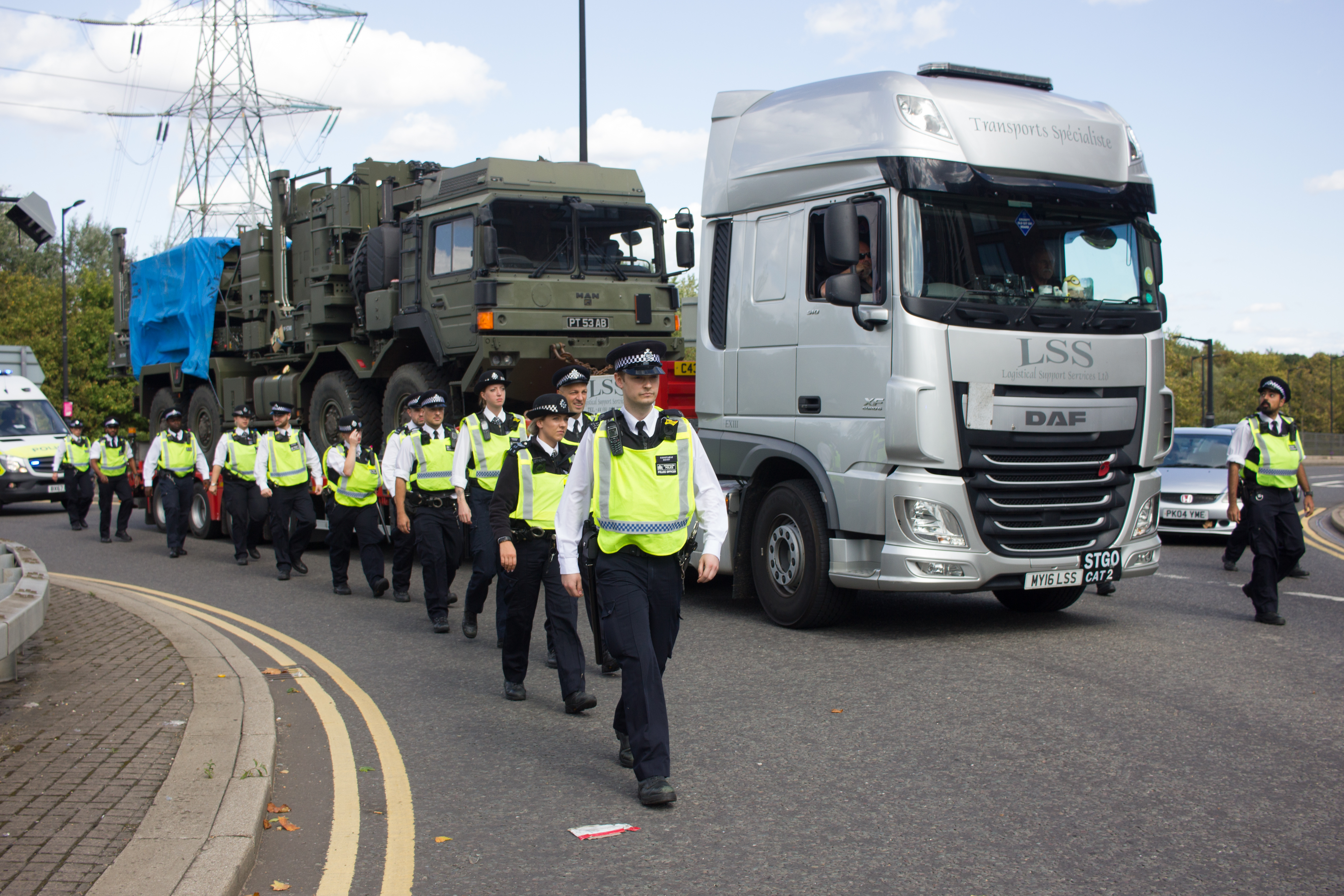
One of the world’s largest arms fairs will open in the UK on Monday. For a week, state of the art weapons will be exhibited to select buyers at the DSEI Fair, held at London’s ExCel Centre.
The annual event is attended by governments from all over the world, at the official invitation of the British government’s Defence and Security Organisation.
In the week running up to the arms fair demonstrators mobilised by activist group Campaign Against the Arms Trade (CAAT) set up camp outside of the ExCel Centre and made their opposition to the arms trade known through a series of workshops, performances, speeches and direct actions – including blocking roads and climbing on top of lorries in an attempt to halt deliveries. A collective prayer led by quakers was interrupted by police, who arrested 33 people in an effort to clear the road.
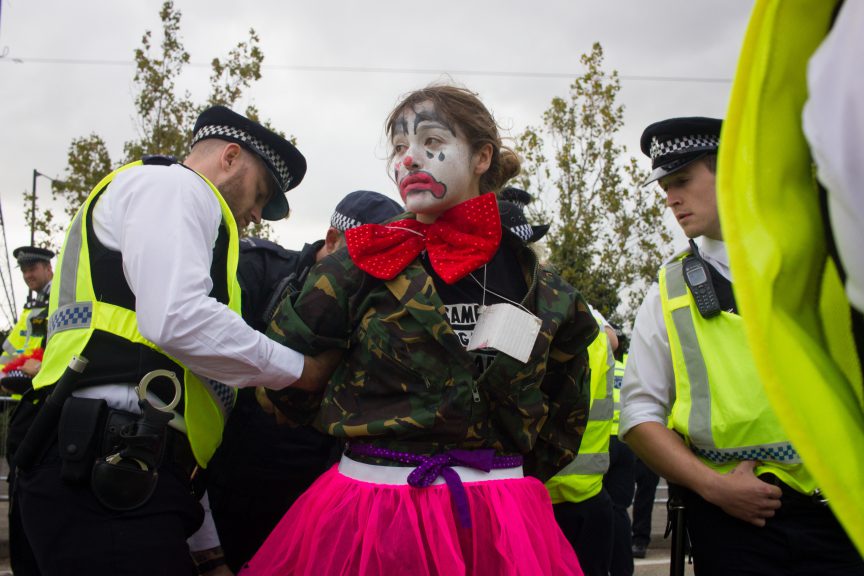
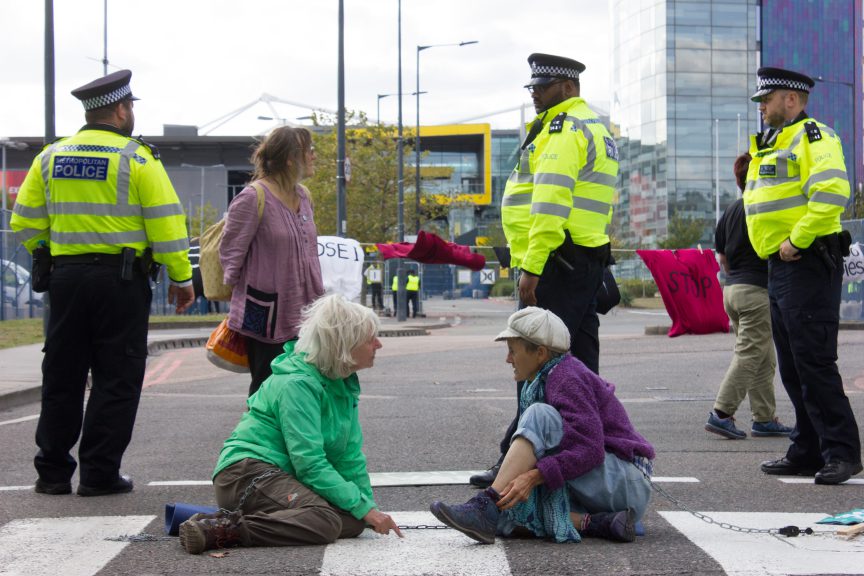
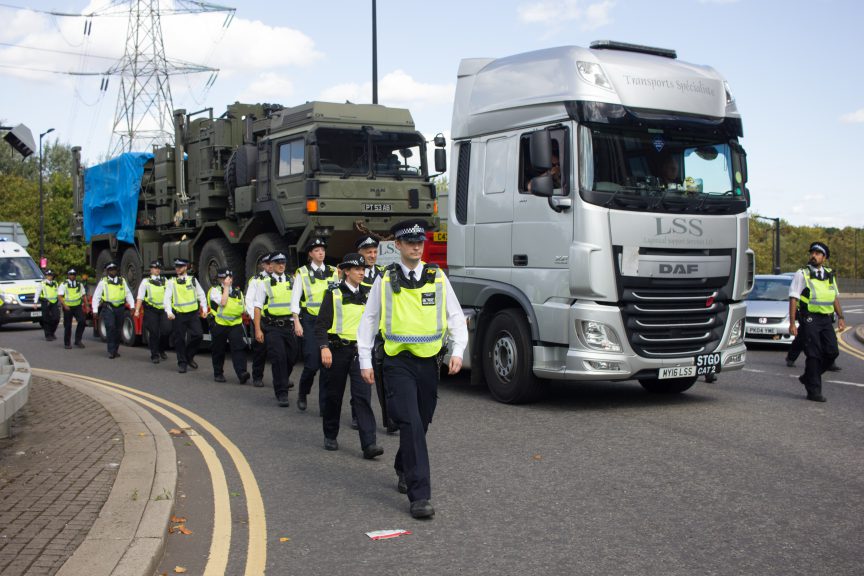
Eight states invited to the DSEI this year are on the UK Foreign Office list of ‘human rights priority’ countries, defined as “countries where we believe human rights issues are of greatest concern”. This includes Saudi Arabia, which is set to attend the DSEI event despite a ruling earlier this year that British arms sales to the country were unlawful.
Saudi Arabia’s indiscriminate bombing of populated areas in Yemen – which at times occur with no warning whatsoever, killing innocent civilians – has been found to be “in contravention of international humanitarian law” by the UN.
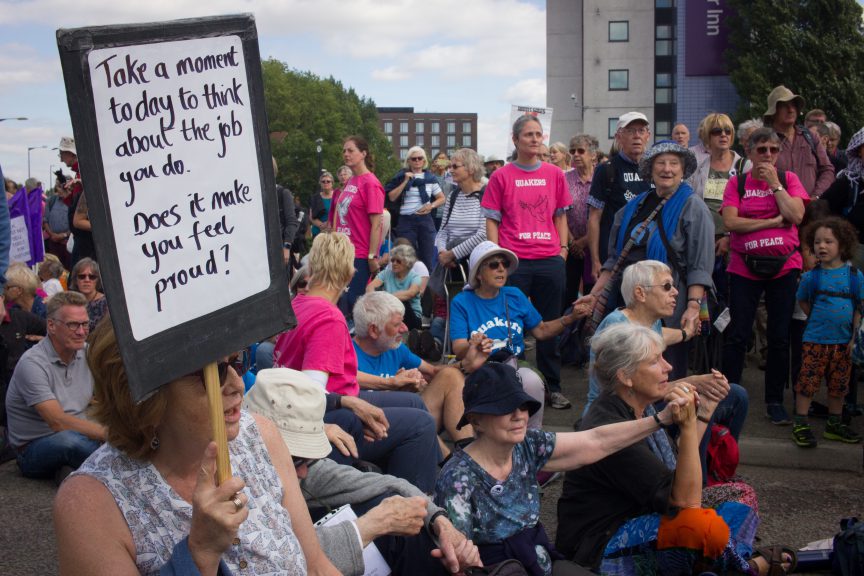
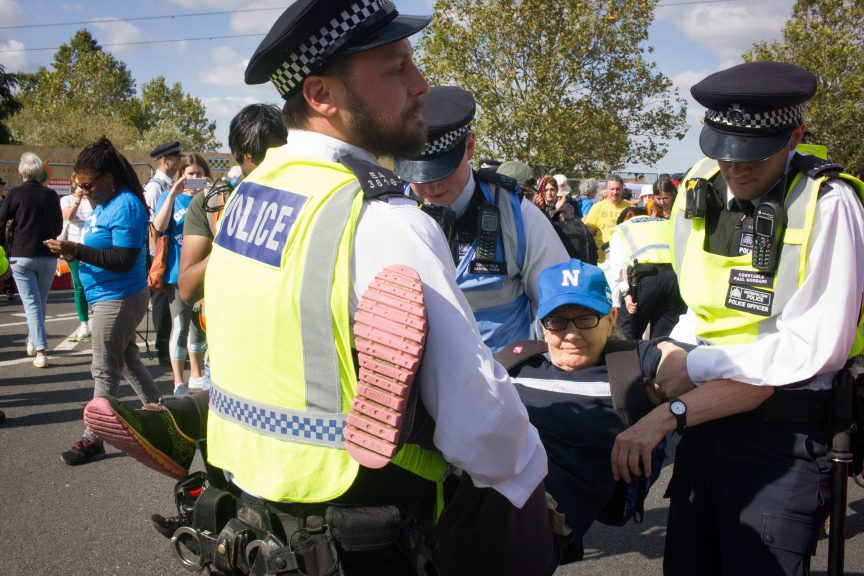 A delegation was also invited from Hong Kong, where almost 2,000 rounds of teargas have been fired at democracy protesters in a matter of weeks.
A delegation was also invited from Hong Kong, where almost 2,000 rounds of teargas have been fired at democracy protesters in a matter of weeks.
We spent a week at the protests, documenting the direct actions and police backlash.
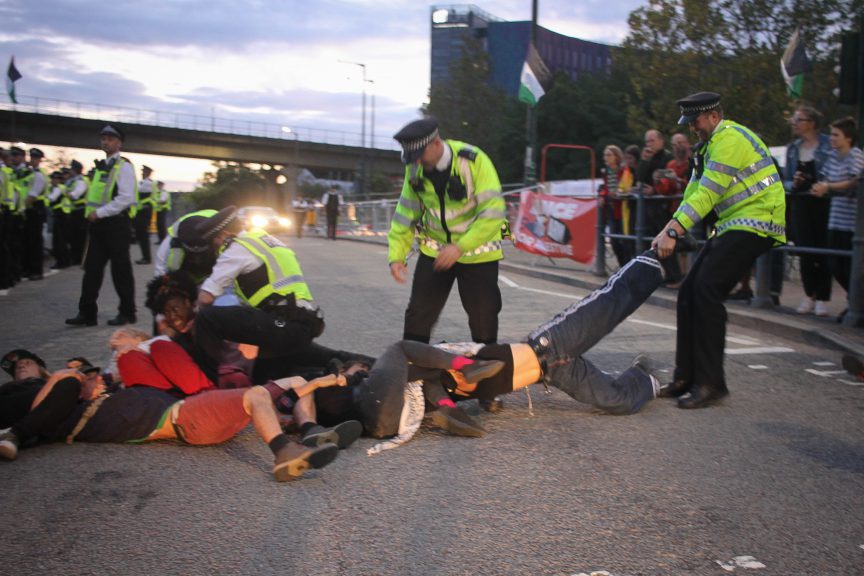
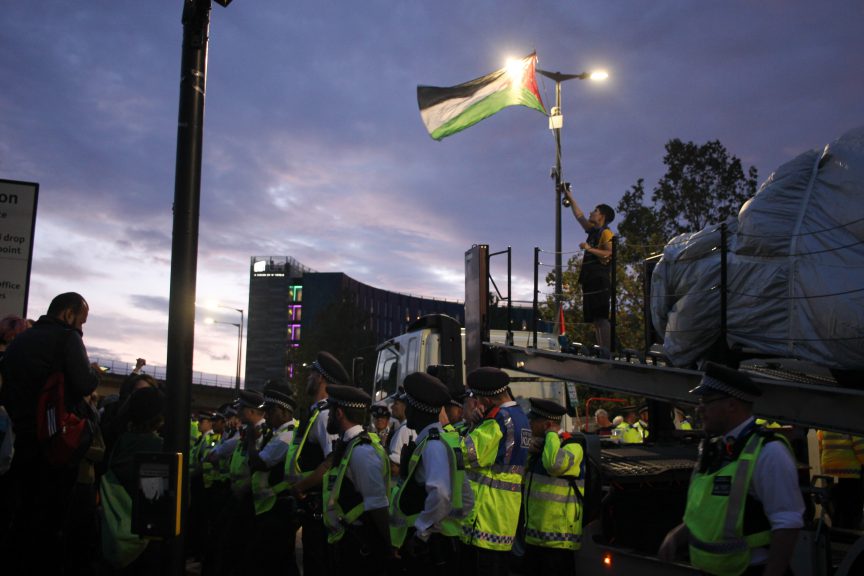 We also asked protesters from different backgrounds and perspectives about what motivated them to join the movement to oppose the arms fair.
We also asked protesters from different backgrounds and perspectives about what motivated them to join the movement to oppose the arms fair.
All photographs by Francesca Mills.
Melina Villeneuve, Ded_ucation
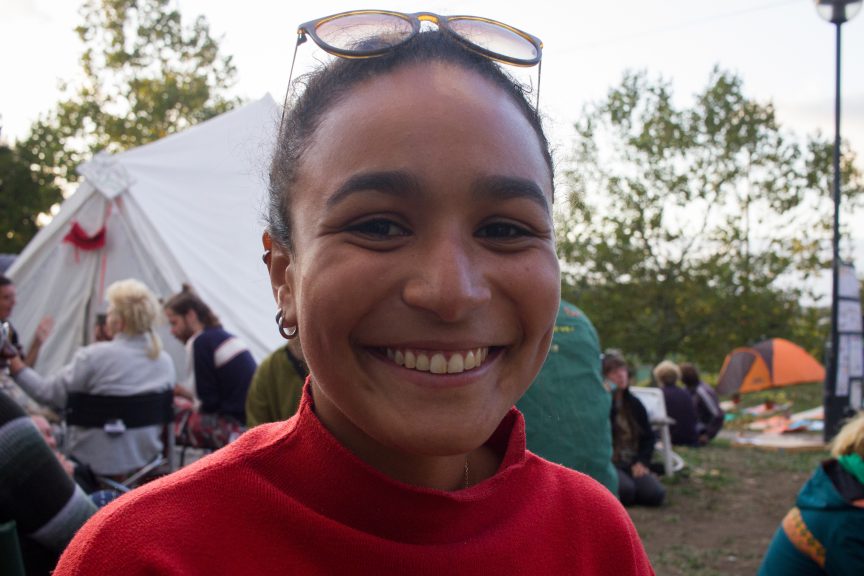
Biggest concern: Climate crisis
Melina: We are no longer at all on the same planet that we were 100 years ago. We cannot afford the environmental damage that war causes. The collective security that we’re talking about is no longer the war on terror, or the war on drugs – it’s about making sure that we can actually survive as a species in the light of the changes that this planet is seeing.
The US military is one of the largest fossil fuel consumers and generators of pollution in the whole world. In the name of collective defence it has over 800 stations scattered around the world – to the point where it’s carbon footprint is bigger than 140 countries combined.
If we dismantle the gross amount of money time and resources that go into “defence”, if we open the conversation about what war does, not only to humanity and people but also [to] the environment, we open up the possibility of investing that money into industries that are more ethical and sustainable and are key to ensuring our survival on a rapidly changing planet.
Angie Zelter, Trident Ploughshares
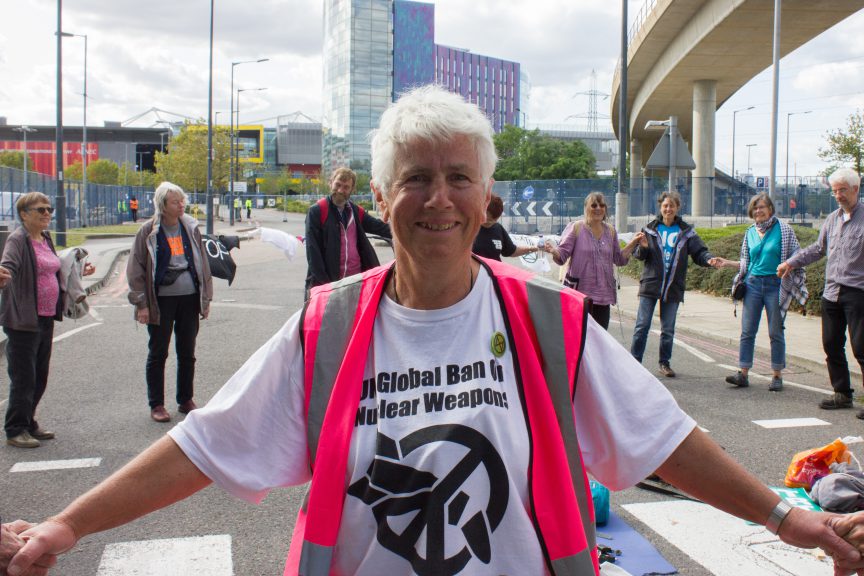
Biggest concern: Nuclear weapons
Angie: I’ve been involved in the campaign against the arms trade for a very long time. I’m here this week because we want to stop as much of the equipment getting into the arms fair as possible.
A lot of people think that weapons, especially the ones going in here, are just rifles and conventional weapons, but those huge companies that make all that material are also part of the nuclear sector. For example, British Aerospace, Rolls Royce and other companies are also making equipment for the nuclear weapons system.
The nuclear threat is another existential threat that has climate impact. If even one or two nuclear warheads go off it creates a nuclear winter and a famine, and when all those particles come back down to earth, although there’s initially a slight cooling effect, it [then] suddenly creates a big climate increase.
Because of the breaking of the nuclear agreements between the US and Russia, we’re back to a kind of cold war situation. The amount of warships and military forces Trump is putting in the Chinese area is encouraging more nuclear forces to go there. We still have nuclear weapons and they could still be used. And that’s why we’re here today.
Lyndsay Burtonshaw, Quakers
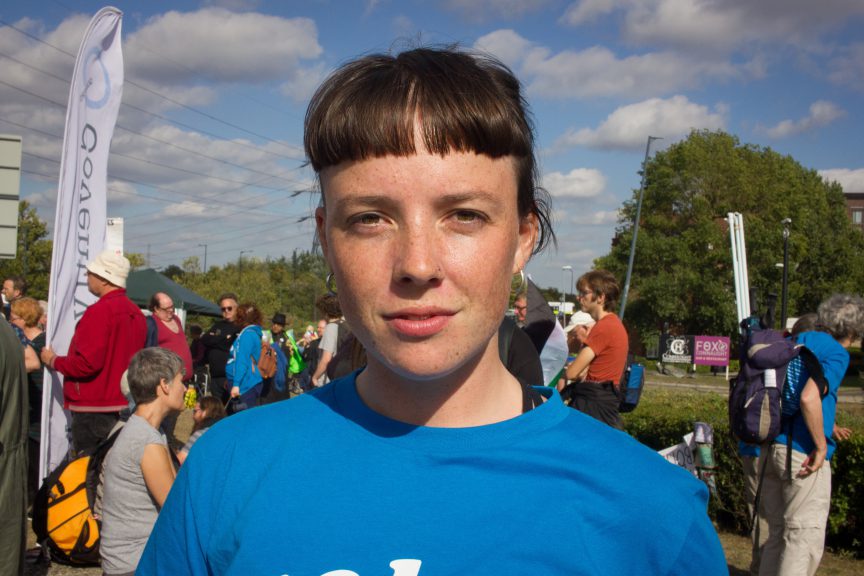
Biggest concern: War
Lyndsay: As quakers we see making things – and making things for profit – that kill people, as wrong. It’s state sanctioned terrorism. CAAT – which was set up by Quakers and maintains a huge Quaker following – managed to get the UK government to say that it was illegal to sell arms to Saudi Arabia. Yet it’s still happening. As Quakers we see those children in Yemen as just as important as any other child. The fact that arms that are made and sold in the UK and profited off by British People will kill those children and other civilians is unacceptable.
The Quakers have a strong history of the peace testimony and standing against war. We support conscientious objectors, people who don’t want to fight war. We oppose war in all of its forms and always will.
Huda Ammori, Palestine Solidarity Campaign
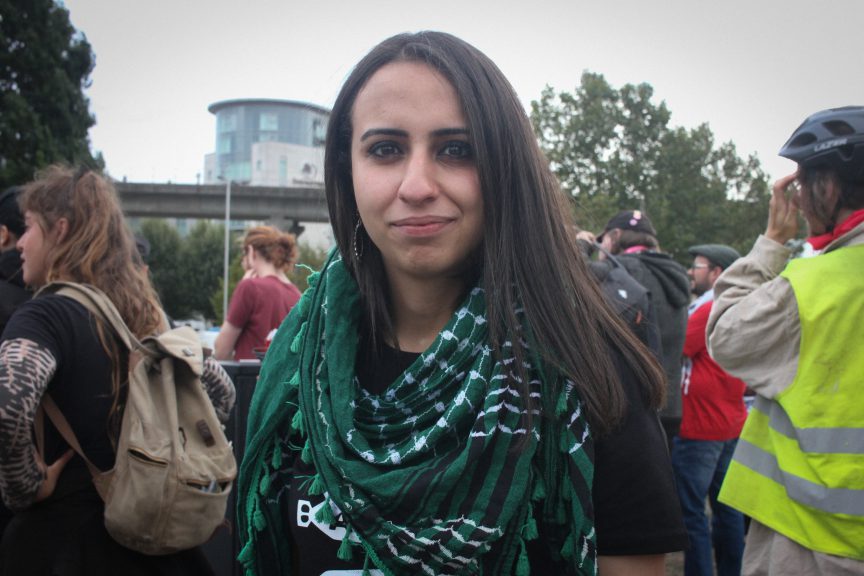
Biggest concern: Arming Israel
Huda: At the fair Israel will have its own special designated area to market its weapons, which are marketed as ‘battle tested’ because they’re used on Palestinian civilians in Gaza.
For the past year and a half Palestinians in Gaza have been marching to the fence that’s trapped them in this brutal siege for over a decade. 80% of the Palestinian population in Gaza are already refugees who have been displaced from other parts of Palestine, so when they march to the fence which has entrapped them, they’re demanding their rights to return to their homes, which is a right enshrined under international law.
Israel has met these protesters with brutal live fire, sniping down over 250, and injuring over 30,000 Palestinians. It’s the UK government who continue to platform these war criminals, whether it’s in arms fairs or whether they continue to profit from the oppression of the Palestinians, by continuing to buy and sell weapons from Israeli arms companies.
This is the first year that Israel has received a special invitation from the ministry of defence, despite the ongoing human rights violations happening in Gaza, despite the ongoing demolitions of Palestinian homes in the West Bank.
We have to take a stand against this and make our voices clear – that we will not stand for this arms fair happening. We’re not going to have it happening in our streets and we won’t stop until the UK government implement an immediate arms embargo between the UK and Israel.
Hiba Ahmad, Our Future Now
Biggest concern: Justice for all, migrants’ rights
Hiba: Our group Our Future Now feels that the arms industry reinforces all the injustices in the world.
Here you can talk about violent structures, but it can be abstract if you’re in a position of privilege. In some places there is no such thing, your body will always make you a target.
The arms fair isn’t just an arms fair for people to come and buy weapons – it’s like a networking event. People attending will get together and decide, ‘oh, how can we make migrant lives even more of a hell?’ It’s kind of a display of power, in the grossest sense of the word. They’re literally showing how many lives can be destroyed with just one weapon, or whatever.
Drone technology has become even more popular because of fairs like these. It makes people so disconnected, so that people who are actually doing the killing are sat behind a computer screen and they don’t need to see the violence they’re inflicting. They see it as some sort of video game.
The mentality of people is that you need to have weapons to protect yourselves – and they’re making a lot of money out of it. I don’t see that disappearing anytime soon, because this type of violence doesn’t go away in a generation or two. But even being here and holding [the fair] up by a few hours – that costs them money, and it makes it more and more unattainable for companies to keep on doing it.
Francesca mills is a freelance journalist based in London who reports on humanitarian issues. See frankiemills.org for more of her work.
